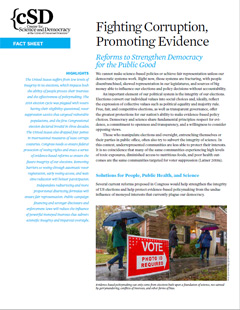Democracy reforms are vitally important to protect evidence-based policymaking and help underrepresented communities advocate for their health and safety.
In the face of climate change, air and water pollution, and other pressing public health and safety issues, our future depends on our ability to make evidence-based policy decisions now. Free, fair, competitive elections and a transparent, accountable system of government offer our best hope for meeting these challenges.
But currently our democratic systems are fracturing, with people disenfranchised, skewed representation, and big money influencing elections and policies. According to a metric developed by the Electoral Integrity Project, the US ranks dead last among 22 Western democracies in perceived electoral integrity.
And it's no accident that the communities most affected by our dysfunctional democracy are also those hit hardest by problems that science could help solve. Suppressing votes and sidelining science are both strategies for shielding moneyed interests from accountability for the harm they do.
What can we do to strengthen the integrity of US elections and help ensure that democracy and science work together to promote the public good? Our fact sheet identifies multiple solutions, many of which are addressed in the For the People Act of 2019 (H.R.1). Here are six reforms that we recommend:
- Eliminate barriers to voter registration by implementing automatic voter registration (AVR), same-day registration (SDR), and pre-registration requirements for 16- and 17-year-olds.
- Protect voter lists from manipulation by prohibiting states from purging voters based on failure to vote or minor inconsistencies in spelling or punctuation between registration lists and IDs.
- Expand early and provisional voting to ensure that all voters have access to the ballot regardless of limited time or transportation resources or lack of identification.
- Rein in gerrymandering and partisan bias by requiring nonpartisan redistricting commissions and encouraging proportional representation, which leads to more representative outcomes.
- Limit the political power of moneyed interests by requiring disclosure of corporate political contributions, strengthening the currently dysfunctional Federal Elections Commission, and implementing public campaign financing.
- Address officials' conflicts of interest through stronger ethics rules and disclosure requirements.
Reforms like these can help ensure fair representation, independent science, and evidence-based policy. They deserve bipartisan support.
Downloads
Citation
Latner, Michael, Gretchen Goldman. 2019. Fighting Corruption, Promoting Evidence: Reforms to Strengthen Democracy for the Public Good. Cambridge, MA: Union of Concerned Scientists. https://www.ucsusa.org/resources/fighting-corruption-promoting-evidence




